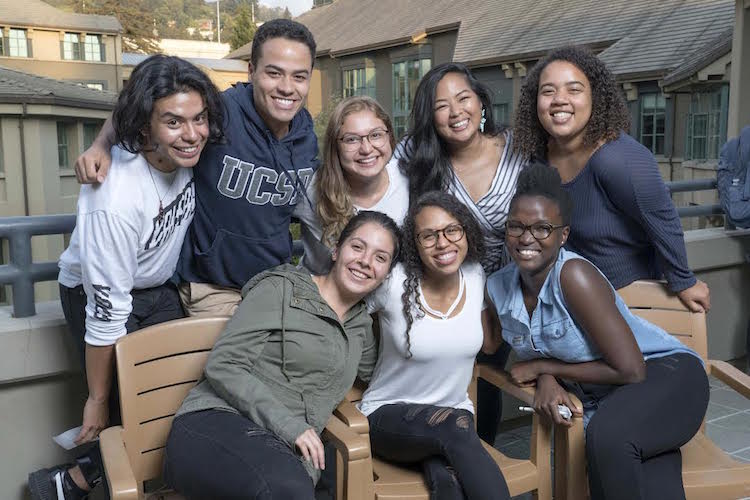
Top (L to R): David Aguilar, BS 19, David Webb, BS 20, Claudia Diaz BS 19, Asst. Admissions Director Mary Balingit, and Mia Character, BS 20. Bottom (L to R): Maria Ortega, BS 19, Frances James, BS 20, Habiiba Malingha, BS 20. Photo by: Jim Block
Getting into one of the best public universities in the world is usually met with joy and relief. For Claudia Diaz, a senior at the University of California-Berkeley Haas School of Business, it was met with hesitation and confusion.
Diaz grew up in South Central Los Angeles “in the hood,” and says when she first learned and told her parents she’d been accepted and would be attending UC-Berkeley, they had a hard time understanding why she was leaving.
“Neither of my parents completed high school. My dad only finished third grade in elementary school in Mexico,” she says. “We grew up super poor and our family of four shared and squeezed into a studio space.”
Though her parents had casually encouraged her to go to college, they were thinking a local community college so she could stay near the family. When Diaz chose UC-Berkeley over UCLA, she says her parents wondered why she needed to go all the way to Berkeley — a more than six hour drive from South Los Angeles — when she had opportunities closer to home.
“Their biggest expectation was for me to graduate high school, but my high school teachers and counselors helped me see that I could do more,” Diaz says. “It was definitely hard to leave my family behind because they saw me as betraying our value of staying close to home. They couldn’t see that I was actually honoring their value of family and sacrifice for the betterment of our future.”
LOOKING FOR HER COMMUNITY
But once on UC-Berkeley’s campus, the reality of the differences between her background and that of her classmates. Diaz says she saw classmates and professors making light of situations that were real and painful for her. She shared a time in class where they discussed whether employees should be allowed to speak a language other than English at their workplaces.
“I was frustrated because they weren’t realizing that they were discriminating against U.S. immigrants, like my parents, who cannot speak English but still have to work,” Diaz says. “I was even more frustrated to know that I had to be the one to speak up so they wouldn’t leave class with such a narrow-minded perspective.”
She added that it was incidents like this that made the emotional tax of being a minority clear to her — even at a school like Berkeley known for its social justice movements.
“After experiencing microaggressions from professors with privileged backgrounds, I relied heavily on my community for support and motivation to educate my professors on their behavior,” Diaz says. “Empowered to continue providing support and a sense of belonging to people of color at Berkeley-Haas, I began to look for opportunities where I could serve my community.”
INTRODUCING THE RISE PROGRAM
Diaz did just that. Today, she is a steering committee member of the inaugural Berkeley RISE (reach, inclusion, service, and equity) admissions outreach program, which seeks to increase applications from under-represented minorities.
Sponsored by the Haas Undergraduate Program Office, RISE works to create an inclusive community for under-represented minorities throughout Cal, especially those interested in business. RISE aims to encourage more minority students to consider Haas through informative workshops and events that guide them through the Haas undergraduate application process.
“At RISE, I use my experiences to provide recommendations on necessary resources and how to better cater the resources to the people of color who need them,” Diaz says. “My goal is for incoming students to not only feel a sense of belonging but to also have the support to thrive academically.”
FINDING THE RISE PROGRAM
Despite being the only one from her high school class to be accepted into UC-Berkeley, Diaz says she still felt academically behind her peers. The self-doubt caused her to began questioning if she knew how to do things like write an essay properly. And when the jokes began, she says it became clear that her realities had never been the same as her peers.
“It could have been a learning experience, but no one checked the students when they joked. It was like they didn’t imagine that anyone from a low income background could be sitting in their class and taking the same lessons as them,” she says. “I used to wonder why I was chosen to come to UC-Berkeley, but now, I know that there is value in the different perspective on things I have.”
Diaz joined Berkeley RISE three years ago when it was known as Freshmen to Alumni Program (F2A). The F2A program was founded five years ago to reach out to under-represented minority students, defined as African American, Hispanic American, and Native American students, and was renamed RISE in 2018. Diaz says she came across the program while looking for advising from the Haas School of Business and was invited to join a professional development workshop they were hosting.
RISE’s Assistant Admissions Director, Mary Balingit, says that she sees herself as a “demystifier” who helps students who feel like they don’t belong at Haas — or in the business community.
“One of the reasons minority students may automatically exclude themselves from Haas is the belief that it’s too competitive and they’re not going to get in,” Balingit says. “Haas is a place that is open to all students and there are multiple centers, clubs, and organizations they can join to utilize the resources available to them if they are interested in business.”
The other reason, she says, is they simply feel out of place because there is a lack of representation in business, and the time is ripe for intersectionality to invite more students of color into Haas.











Questions about this article? Email us or leave a comment below.